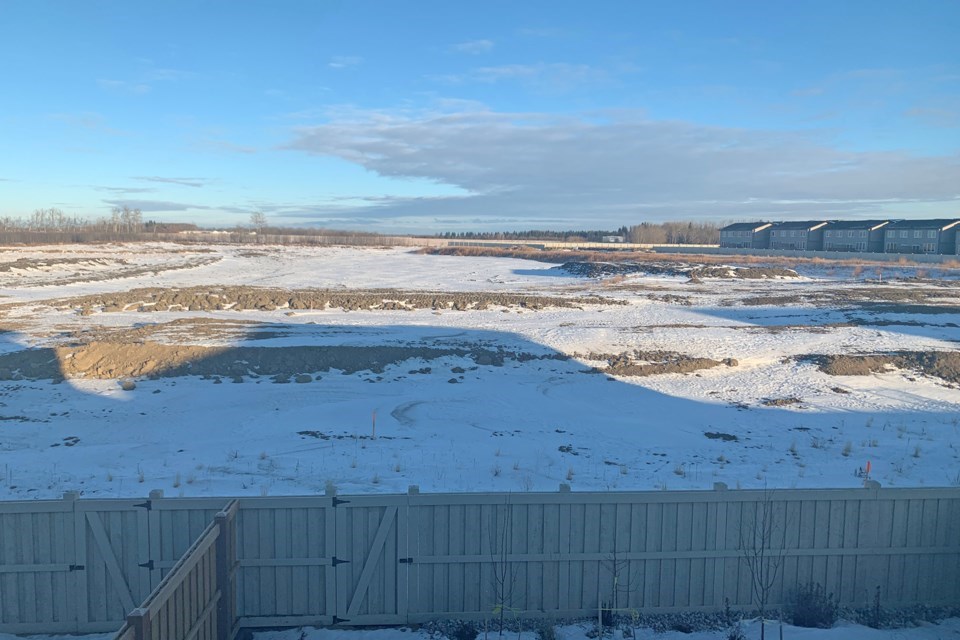St. Albert city council heard on Tuesday an urgent servicing project in the city's northeast could cost more than $60 million, and a moratorium on development in the area might be needed until the project is finished.
The servicing project, which covers three separate, but related, projects, is needed to address the stormwater, sewage, and water infrastructure capacity constraints in the city's northeast neighbourhoods, like Erin Ridge North. The constraints led city administration to issue a temporary hold on development in late 2022 except on a case-by-case basis. It's possible any new development could lead to infrastructure failures, meaning homes in Erin Ridge and Oakmont could experience basement floods and sewage backups.
Coun. Wes Brodhead said doing nothing isn't an option.
“If we don't do something, the capacity to continue to develop up there comes to a grinding halt,” he said. “The pipes are already full.”
“The last thing we want is to authorize more development and then have a backup of the sewer system, and then all hell breaks loose.”
The project first came to council's attention in May 2022, when administration brought forward a $2 million funding request, which council approved, to complete the design work for all three projects. Council heard on Feb. 13 the design work is 60 per cent complete, and the “over $60 million” estimate could change once the design is fully completed.
“Without investment in this infrastructure, a significant area of the city will not be able to proceed with development,” reads a report to council.
During the standing committee of the whole meeting on Feb. 13, council heard from three developers who own land in the area that moving forward on the servicing project needs to be the city's priority despite the significant cost, which the city would need to fund through debt.
“Understanding that there is a lot of asks for debt and there are limits, I guess we're asking you to prioritize this,” said Susan Keating, the vice-president of community development for Melcor Developments.
“If this project doesn't go forward with approval ... population growth is a big one and the main one that will be reduced, because one half of the city will not be able to grow,” added Mike Yochim, the vice-president of operations for Landrex.
Yochim said Landrex has about five acres of commercial property — for which the company has already signed contracts with prospective businesses — that may not be able to be developed until the servicing work is completed.
“That's a big one. That's [an] imminent negative impact for us, and I believe the city, too,” Yochim said.
In response to a question from Coun. Sheena Hughes, Keating said Melcor Developments isn't in a position to be a funding partner for the project.
“I can't speak for everybody, but from Melcor's perspective, we're not in a position to contribute something outside or out of sync with our development program,” Keating said. She added that, in a way, developers have already provided funding for the project through the off-site levies they pay the city.
Off-site levies are a method of funding infrastructure development when a municipality can't pay the full cost. In St. Albert, the off-site levy program involves the city, or a development company “front-ending” servicing costs, with a guarantee other developers who benefit from the infrastructure development will pay city-determined levies in the future, which are then partially doled out to the city or company that fronted the cost. The levies are collected and managed by the city, which then uses the funds for future infrastructure costs.
However, in some situations, such as the northeast servicing project, there aren't enough funds from past levies to fully fund new projects, which creates the need for debt financing.
“We pay our levies,” Keating told council. “Our perspective is that we've been helping by developing in St. Albert and adding levies into these pots of money, which now don't have enough money to pay for the infrastructure that's required.”
Next update coming in April
Council heard from the city's director of engineering, Dawny George, that the city expects the project design to be over 90 per cent complete in April, which will allow city staff to develop a final project charter for council's approval. If the charter is approved, administration will bring forward a corresponding borrowing bylaw.
Coun. Ken MacKay said one major concern he has is that although the $60 million or more servicing project is recoverable by the city through an off-site levy, it could be “decades” before enough development occurs and enough off-site levies are collected to recover the city's expense.
“We've got to balance that also with the needs of the other parts of the community, particularly like Lakeview Business District,” MacKay said, referring to the city's other servicing project that's expected to come before council this year and could cost as much as $80 million.
“It's basically going to have to be something that the city does and that's a big debenture to take on, particularly at this time with everything else that's coming to us.”
In an interview prior to the Feb. 13 meeting, Hughes said she thinks the affected developers should help the city cover the $60 million or more cost.
“I think that we should be looking at the development partners,” Hughes said. “[Given] the fact that it's benefiting them, they should be investors in this with us.”
“We only have so much room for debt, and every time you take on one of these debt loads for servicing, there's a risk involved about whether or not there will be enough development that occurs at the pace that you're anticipating it to be.”
Council also heard if the borrowing bylaw is approved this spring, it's expected construction will be complete by the end of 2026.




